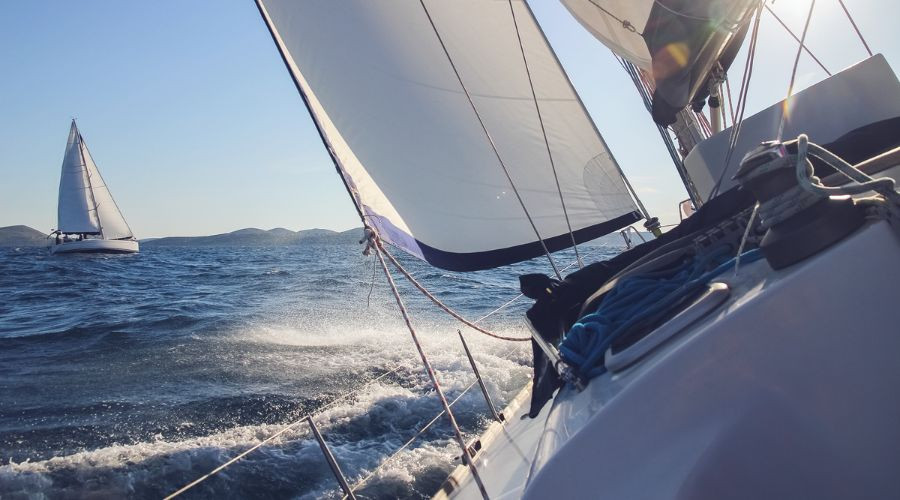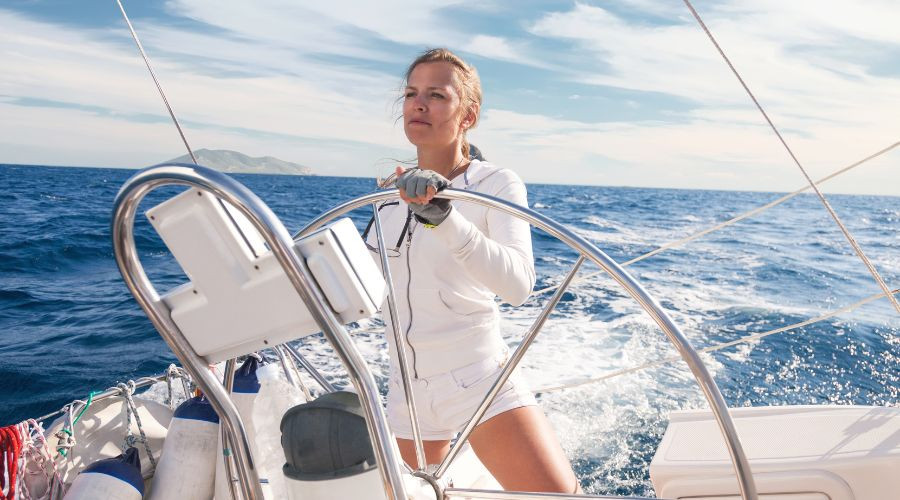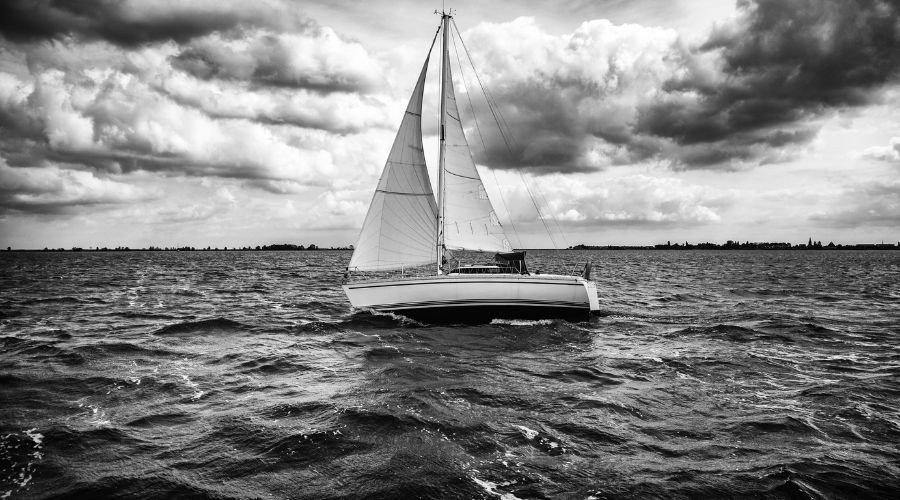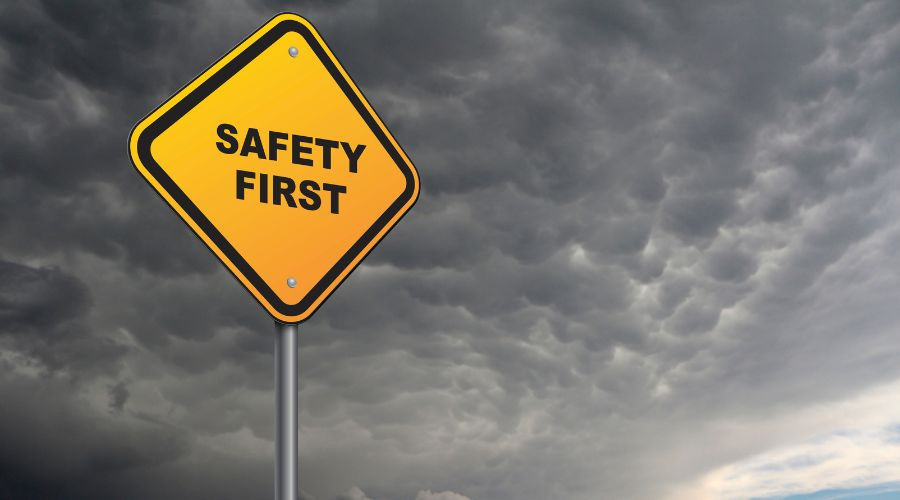11.11.2022.
What does it mean when they say you must always be mindful of your surroundings while sailing? Here are some basics and a couple rules of conduct that you need to know.
There is this beautiful song, "Kud plovi ovaj brod?" by a legendary Croatian singer that goes Where is this ship sailing, where it takes people?
Not only is it one of the most beautiful melancholy songs about sailing, it’s also some 50 years old and well-known in Croatian culture. Why is this relevant to our story?
Our opinion with sailing, based on long-time experience in chartering motorboats and sailboats, is that one must always be mindful and aware of their surroundings. And what does that actually mean? You have to know what you are actually doing at all times and "where is your ship sailing".
Mindfulness is always being aware of yourself and your surroundings more spiritually. But before we become too self-helpful, there is one thing that you have to keep in mind - you have to be extremely mindful while sailing. Or aware, which would be a more exact expression.
Boating safety above all
When people discover boating in general, they are usually overwhelmed by all the sensations and their surroundings as they cruise the Croatian coast. It is quite understandable as our coast is quite remarkable. But one of the things you must take into consideration is boating safety and the rules of navigation. As well as the rules of conduct while sailing and environmental awareness.
There is a new type of guests in charter, and these are the ones that have all the proper licences but actually lack more adequate sailing experience. Yes, they do have the will to sail and the utmost desire. Still, they are missing knowledge of good sailing conduct, knowledge of practical boating guidelines and an actual understanding of how to be aware of their surroundings.
When you read some information, everything looks good on paper or on your mobile phone. You think, "that's not so difficult". And the next thing that happens, you are jumping into the sea to moor your chartered yacht on a buoy because there is no place on the pier. And because you were unprepared for this situation. And because you don't know how to properly tie a yacht to a buoy.
More and more people want to experience new things and make quality memories. Even more people find sailing as one of the most romantic things they have ever done. But once they discover sailing and boating and their charms, they will do anything to set sail along the Croatian coast. We love that more people are falling in love with sailing and our beaches. But we love more that they are aware of what they are doing and that they know a thing or two about boating safety.

Examples of mindfulness while sailing
There are many rules and regulations to sailing; it's not all fun and games. Well, it's fun, and you can play plenty of games. But sailing also brings a specific responsibility that many people (especially inexperienced sailors) tend to forget.
Sailing is not easy and is not similar to driving on the roads. There are no designated routes or lines, crosswalks, or marked parking spots.
On the open sea, you can go anywhere and do what you want. More or less. But you must be careful of the other boats around you and the rules of navigation. One of the most important things – you must be respectful of the sea and the marine life.
We bring you a list of some essential things you should know an do:
Make a plan/be prepared – prepare a route in advance to make your life easier and your vacation more carefree. Know in advance where to moor or where to anchor during the night. It’s best to plan where you are going and not wander aimlessly. But if you want to wander, wander away. But make sure to know where the next port is and does it have a marine gas station.
Don't panic – if something unplanned happens, such as the unexpected wind change, don't panic. In Croatia, wind changes and sudden storms are not unusual. But also, they are always announced in advance on weather channels and apps.
Being prepared is of utmost importance; if you are not, don't let yourself lose it. Make sure to find a secure bay to anchor in or the nearest port if you can manage. Don't allow yourself and your dearest ones to be rescued by others or Coast Guard.
Don't overestimate your abilities – know what to do in every situation and consider unknown factors such as weather changes, summer showers, and high winds. If you are unsure if you can manoeuver a yacht in the rain, take shelter until the rain passes. It's an intelligent thing to do.
Be prepared to fend for yourself – yes, we know your charter company, their base manager, and skippers are ready to have your back. But be aware that help is not always available immediately. If someone has a severe accident or gets ill, you must know what to do, who to call, where is the nearest port, doctor, and such.
Know you way around a yacht at all times – this means you don't have to be a mechanic and change engine’s valves, but some basic knowledge and common sense are highly recommended. As a car driver, you have to know how to add oil and petrol to your car anytime.
The same is with a yacht, but even more so. Simply put, you really must know your way around a yacht. You must know the basics if there are high waves, such as closing the hatches on your vessel and taking safety measures. Many people don't.
Be respectful towards the sea and nature – now, we will not expand our list more by recommending that you use renewable sources of energy as much as you can (as you should). Many people imagine that the sea can endure whatever. But that is not so, and it shouldn't be.
We will gently remind you not to litter and ensure you leave all the locations and beaches you visit in the same state you found them. Or in an even better shape.
We don't have to tell you that you should not empty your black tanks into the sea or throw your garbage overboard. That is not done. But we will look the other way if you give your lunch leftovers to the seagulls, as we are very fond of them.
Don't "enjoy" yourself too much - by this, we mean you are not to drink and “drive”.

Boating guidelines – be conscientious
Being unprepared for the basest of situations will not only make your vacation a bad experience, but it will also put unnecessary stress on the people in your company. Being unprepared and unaware of your surroundings in the open sea is the worst thing you can do.
You don't go hiking in the mountains wearing flip-flops, don't you? So, you should know that you have to reel the anchor back in after anchoring before resuming sailing. We know some situations in which people didn't do just that, but why should that be you.
There are some basic boating guidelines, except these we already mentioned - don't litter, don't empty your tanks in the sea, and be prepared. What else is there? Well, there are a bunch of rules and regulations that you have to keep in mind, and some essential are:
- Respect others while in navigation – this means giving way if necessary; the sea is vast and you can sail as far from others as possible. But if that is not the case, give way properly.
If you are on a collision course, you must alter your approach to pass each other from the port (left side). If other sailors don’t obey the rules (which is rarely the case), be the bigger person and move as far away as you can from them. Usually, the yacht that is on the port side gives way to the one or starboard side. This is one of the proper conducts of navigation, and when in doubt – give way anyway.
- Help your fellow man in need – this is self-explanatory, but it is a way that a sailing community works. While navigating the open sea, the sailing community tends to behave as a family of sorts. The more experienced sailors, even more so.
They will most likely go above and beyond to help you, and you will be glad to learn a thing or to. Or get a tip on an excellent mooring spot nearby. You have to return in favour. If you see anyone in need of your assistance in any way, you assist. It's simple as that.
- Respect rules and regulations - if the sign says don't do this or that, or that you are near shallow water, don't test it. Respect all rules, signs and regulations, or you can end up stranded, damage your yacht and put your loved ones in danger. If the warning on the bridge states that you cannot pass if your mast is higher than 15 meters, don't try to test this theory. It is not one; it is a fact.
- Have proper boating safety equipment – yes, we know every yacht in the charter has proper safety equipment and safety vests, but make sure that is all accounted for. Don't forget to mention in advance if you need a safety vest for a child or for a safety net. These things are up to you to have in mind. The charter company by itself will offer them to you by default. But it's better to be safe than sorry.
- Don't speed – this boating guideline is also self-explanatory. Don't exceed the speed limit when manoeuvring a sailboat or a motor yacht. In Croatia, that limit is 3-5 knots.

Sailing life is not a life fit for everyone
You have to know that to book and use a yacht from a charter in Croatia, you need to have adequate certificates and essential experience. Even more than that, because sailing and boating are not like driving a car or a bike. It is much more complex than that.
People who sail like to call their style a lifestyle, they are totally committed to sailing, and they can hardly wait for the next opportunity to do so.
But the yacht charter business has shown us – sailing life is not for everyone. Sometimes people and boats don't click, and you must remember one thing – maritime accidents may be rarer, but they can also be devastating in damage and human life. Just because someone didn't pay attention or didn't have basic knowledge of sailing safety.
It's not recommended for you to act all heroic or lie even and charter a yacht and then set sail without the most basic knowledge. The best is to book a skipper for the duration of your stay and to know some essential tips on how to rent a perfect yacht. You will be glad you did so.


